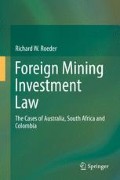Abstract
This section will summarize the results from the analysed jurisdiction, compare the findings and analyse similarities, differences, and key developments and trends in the legal frameworks for foreign investments in mining projects in Australia, South Africa and Colombia (section M.I-X). It will finally discuss whether these specific legal challenges can sufficiently be analysed by the legal framework provided for by general foreign investment law (section M.XI).
Access this chapter
Tax calculation will be finalised at checkout
Purchases are for personal use only
Notes
- 1.
Bungenberg and Hobe (2015).
- 2.
Energy Charter (2014), Dispute Resolution.
- 3.
While the author considers the term “Soft Law” to vague, considering the importance of the Corporate Social responsibility policy answers of the international mining companies to the question of the Social License to Operate some might call CSR policies “International Mining Investment Soft Law”. Soft Law is usually used to describe non-binding recommendations, resolutions and declarations of bodies, organs and special organizations of the United Nations. The term Soft Law aims to grasp the regulatory power of such recommendations, resolutions and declarations despite their lack of judicial enforceability. In a study called Mining, Environment and Development, published by the United Nations Commission for Trade and Development (“UNCTAD”), the International Soft Law of mining is defined as including demands of international conferences and agreements such as the 1972 Stockholm principles, the United Nations Conference on Environment and Development (“UNCED”) Rio declaration and the UNCED Agenda 21. In the context of international business law and foreign investments, international codes of conduct are considered to be International Business Soft Law. They might be suggested by international organizations or NGOs, often with participation of the respective industry. Those international codes of conducts include the Berlin Guidelines, the ISO 14000 standards and the UN Global Compact.
- 4.
AngloGold Ashanti (2013).
- 5.
- 6.
ICMM (2014).
- 7.
Pulido and Ramiro (2014), p. 107.
References
AngloGold Ashanti (2013) Community and environment management standards. Available online at: http://www.anglogoldashanti.com/NR/rdonlyres/91825948-F0BF-40CA-AA0E-D43024F2DD26/0/CommunityandEnvironmentManagementStandards.pdf, updated on 9/20/2013, last checked on 15 February 2014
AngloGold Ashanti (2014) United Nations Global Compact. Available online at: http://www.anglogold.com/Sustainability/Global+initiatives/UNGlobalCompact.htm, last checked on 15 February 2014
Bungenberg M, Hobe S (eds) (2015) Permanent sovereignty over natural resources. Springer International Publishing Switzerland, Cham [u.a.]
Energy Charter (2014) Dispute settlement. Available online at: http://www.encharter.org/index.php?id=269, last checked 01.03.2015
ICMM (2014) Mining: partnerships for development position statement. Available online at: http://www.icmm.com/page/17427/mining-partnerships-for-development-position-statement, last checked on 15 February 2014
Pulido A, Ramiro P (2014) La Responsabilidad Social Corporativa de las Multinacionales Españoles en Colombia. Available online at: http://web.usbmed.edu.co/usbmed/elagora/htm/v10nro1/pdf/7.pdf, last checked on 15 February 2014
Rio Tinto (2013) Ethical indexes & awards - sustainable development 2012 - Rio Tinto. Available online at: http://www.riotinto.com/sustainabledevelopment2012/performance/ethical_indexes_awards.html, updated on 3/14/2013, checked on 2/11/2014
Author information
Authors and Affiliations
Rights and permissions
Copyright information
© 2016 Springer International Publishing Switzerland
About this chapter
Cite this chapter
Roeder, R.W. (2016). Summary, Comparison and Analysis. In: Foreign Mining Investment Law. Springer, Cham. https://doi.org/10.1007/978-3-319-31217-0_12
Download citation
DOI: https://doi.org/10.1007/978-3-319-31217-0_12
Published:
Publisher Name: Springer, Cham
Print ISBN: 978-3-319-31216-3
Online ISBN: 978-3-319-31217-0
eBook Packages: Law and CriminologyLaw and Criminology (R0)

